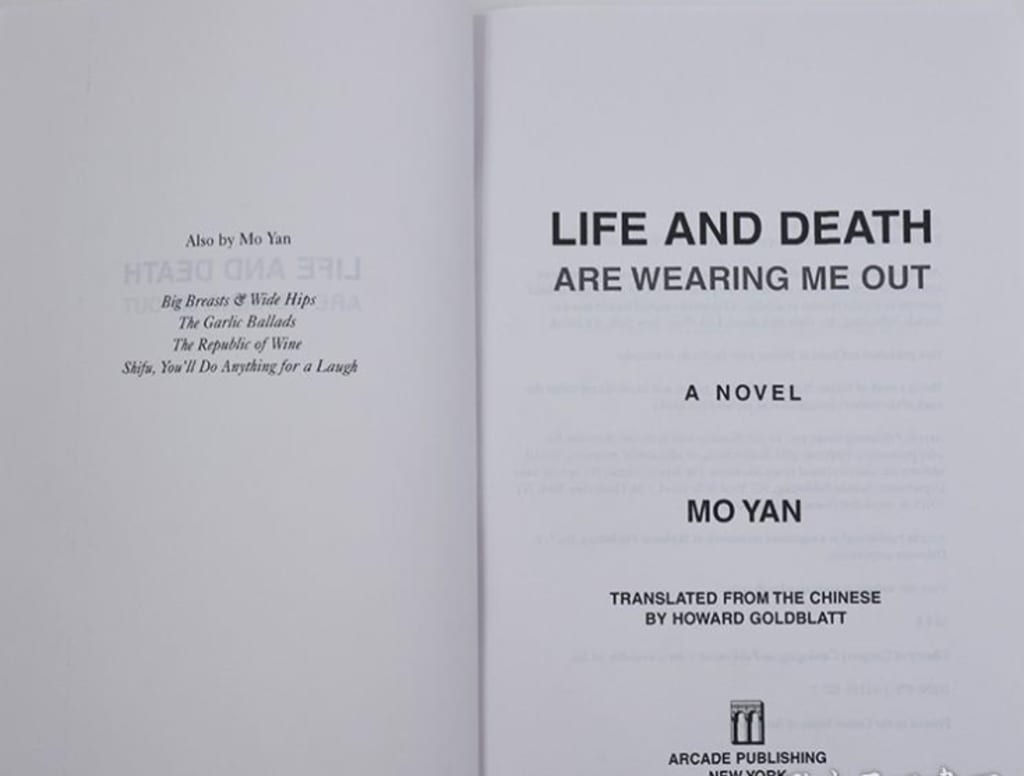
"Fatigue of Life and Death" is Mo Yan's latest novel, with a length of 450,000 words. Even with Mo Yan's prolific and vigorous pen, it can be regarded as an extremely ambitious attempt in recent years. Mo Yan claimed that in order to write this book, he abandoned the computer and returned to manuscript paper, using a "disposable soft pen" (perhaps what we call a gel pen?), working hard and sleeping only two or three hours a day for a month and a half. It was completed, and he said that he got a lot of fun and a sense of accomplishment from the action of "handwriting" again. He also did not forget to emphasize that this story had been pondering in his mind for decades, and this time it was only when the time came that he finally decided to write it down in a flash. Despite the painstaking editing and proofreading, the thought of the thick stack of manuscripts is indeed fascinating. There are many writers who claim that writing novels is not only a great challenge to one's spirit and life habits, but also requires excellent physical strength. Mo Yan's process of writing "Life and Death Fatigue" may be another example. This book is said to have a printing volume of 120,000 copies in the early spring of 2006, and it will be reprinted soon, although it can not be compared with the best-selling book with millions of copies. A higher price, to have such a response, is a rare "high standard" among Chinese writers. This novel continues the theme of "Dahe Family Epic" in "Red Sorghum Family" and "Big Breasts and Fat Hips". In terms of narrative skills, Mo Yan takes the narrative point of view of the landlord "Ximen Nao" who has fallen into the "six paths of reincarnation" and reincarnated repeatedly as animals as the main axis of the first-person narrative. He writes all the way from 1950 to 2000. The flashback dialogue between "Liberation" and "Big Head" is interspersed with the narrative angle of the character "Mo Yan that kid" in the story, to complement the point of view that the first-person narrative cannot reach. In this way, it can not only get the effect of omniscience and omnipotence, but also effectively advance the plot, and try to avoid the limitation of omniscience and omnipotence "having the final say" with multiple perspectives that are indistinguishable from the true and false. Not strenuous. Mo Yan admitted that in the early 1980s, reading a large number of Latin American novels imported from mainland translations was an extremely important enlightenment experience for him. Looking at the representative works of Mo Yan's several novels, "narrative point of view" and "narrative language" have always been the focus of his thoughts here. The exploration of the novel, the obsession with "epic", and the style of combining the "big national narrative" with the "small family history" also make us seem to have a glimpse of the Latin American novelist Bagas. The influence of Llosa and Marquis. The early "Red Sorghum Family" (1987) has a refreshing narrative angle of "my grandfather and my grandmother", and the fusion and appropriation of folk opera and folk music in "The Song of Garlic in Paradise" (1988) and "Sandalwood Punishment" (2001), more It is his experiment to expand the territory of "fiction language". This time, Mo Yan borrowed the concept of "Six Paths of Reincarnation" to tell stories from the eyes of animals. Following the "Sandalwood Punishment" in the form of "multiple people taking turns monologue", he once again found a new "story telling mouth", which is indeed ingenious. As for the multiple perspectives of jumping, it is the "old man" that various senior novelists have used for many years, and it is also a trick that Mo Yan has repeatedly performed in the past. Finding the "correct" narrative style and grasping the overall structure of the novel is indeed crucial, which allows Mo Yan to "tell the story smoothly". But I think what really matters is still "language" and "role". Mo Yan's language is still hearty, whether it is line drawing or character dialogue, it is very vivid, and it is an example of a first-class novelist. It is a pity that this time he repeated the mistakes of "Big Breasts and Fat Hips" (2000). In the last part, the rhythm was messed up, and the ending was a little sloppy. "The Voice of the Novelist" rushed out. Footnotes and lessons have been added to many scenes and plots that could have had a little aftertaste. When they are all explained, the meaning is small. We don't necessarily mind Mo Yan's wild horses, endless diversions, and lots of writing performances for the sake of showing off. These chattering and cluttered details are actually the inseparable pleasures of reading Mo Yan's works. However, the top-heavy structure and hurried ending of "Life and Death Fatigue" still makes people feel lost. How much I hope Mo Yan can stick to the narrative rhythm of the first 400 pages in the last 100 pages, with sand and mud, and the extremely dramatic scene where the important characters withdraw from the stage one after another, just like the finale orchestra of a Broadway stage play. It might be better to end the book with a forceful explanation like the big climax, or in another way, to let the book end within four hundred and eighty pages, rather than leaving a "rabbit tail" as it is now. Still, Life and Death Fatigue is a great book anyway, with some of the best passages that make you cry. Compared with the previous work "Forty-One Cannons" (2003), I don't know Yiyu Hudi, "Life and Death Fatigue" returns to the spirit of "Zhang Huiti" and "retelling a story from the beginning", which is gratifying anyway. Intellectually I understand that there are inescapable flaws in the structure of this book, but emotionally I embrace it wholeheartedly and appreciate it. In my mind, Mo Yan's "perfect masterpiece" doesn't seem to have been written yet - I mean, like Marquez's "One Hundred Years of Solitude", Bagas. The great system like Llosa's "Long Talk at the Bar" and Grashi's "Tin Drum", the balance of characters, structure and language, makes it possible to take into account the grand ambition and the attention to detail. With Mo Yan's talent and vigor, he is a young man in his early fifties. There should be more than one splendid work of the same level hidden in his body. We are very willing to continue to wait.
About the Creator
nian xi
Share insights on reading books





Comments
There are no comments for this story
Be the first to respond and start the conversation.